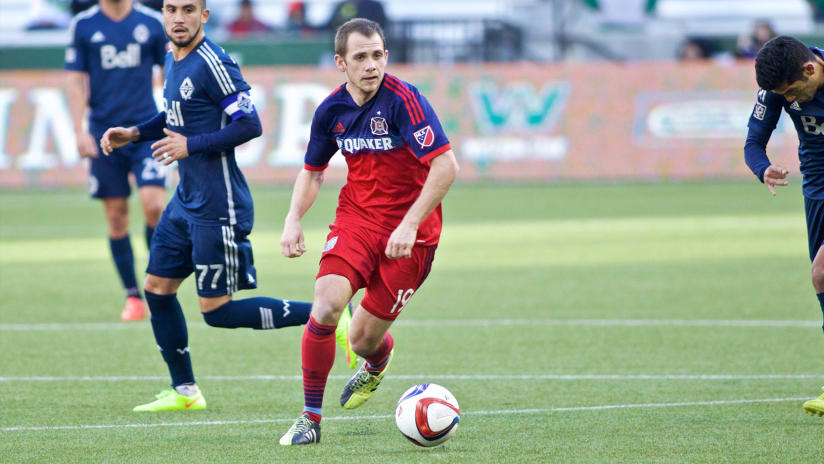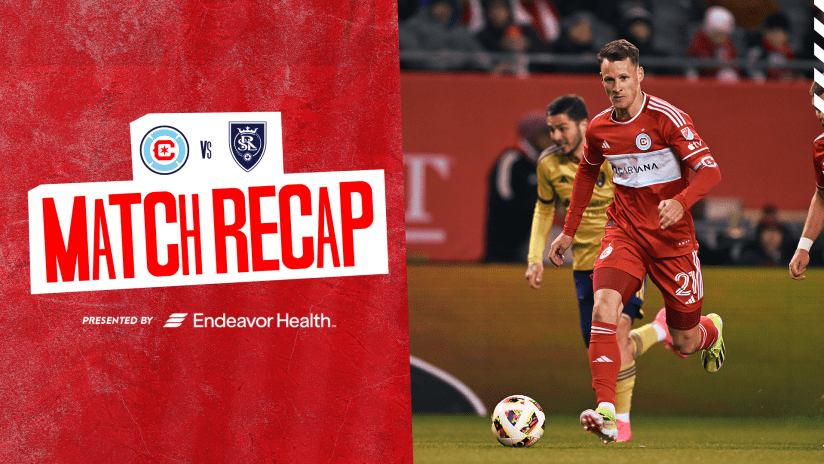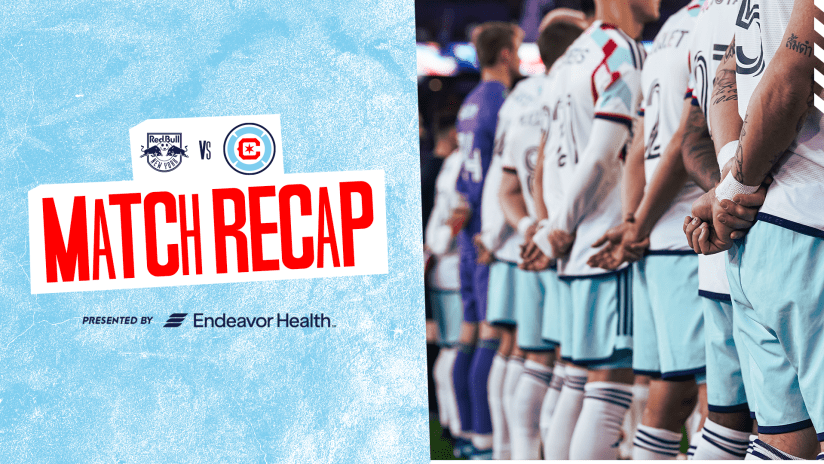When you are fortunate enough to receive coaching from the likes of Frank Klopas and Hristo Stoitchkov as a 10-year-old, you know you are being given the best possible foundation to build a career in professional soccer.
And so it turned out for Harry Shipp, the Chicago Fire Homegrown attacker who built on an impressive rookie year in 2014 by cementing his place in Frank Yallop’s lineup with a series of eye-catching offensive performances this campaign.
Match Preview: Fire vs. Orlando City SC | MLS Analyst on Harry Shipp
The Chicago native burst onto the scene with seven goals and six assists in 33 games last season, and he already has two goals and four assists to his name through 12 games this year. He has started every game in his second year with the Men in Red and has been pivotal to most of the Fire’s attacking efforts alongside the likes of Designated Players David Accam and Shaun Maloney.
“One of my first coaches was Frank Klopas; he coached me for three or four years with the Chicago Wind [U-9 to U-15, now the Fire Juniors North],” Shipp told MLSsoccer.com on Friday, recalling his early tutelage under the former Fire and current Montreal Impact head coach.
“Luckily, I got to be around a lot of Fire players growing up, just from connections with the Chicago Wind,” he added. “I remember I had Hristo Stoitchkov [former Bulgarian player and coach who starred for the Fire in the early 2000s] as a coach, and DaMarcus Beasley’s brother [Jamar] was a coach that worked with us, so getting exposure to guys like that was invaluable as a 9-, 10-, 11-year-old.”
But Shipp’s early days in the game weren’t only fostered by big-name coaches. Shipp’s was supported 100-percent by his parents Terry and Kathleen, and he remembers a particular Christmas present making a huge difference to his soccer education.
INFOGRAPHIC: Shipp's Effect on the Chicago Fire
“Luckily I grew up with some younger siblings that played soccer and had a bunch of kids on my block,” the 23-year-old recalled. “I got a soccer goal in my backyard when I was in fifth or sixth grade as a Christmas present, so ever since then I was just inviting people over and constantly playing in my backyard.”
Shipp, a finance graduate from Notre Dame, continued his progress through the underage setup with the Chicago Magic, who merged with the Fire’s Academy and presented him with his first real taste of the Fire setup when he was 17.
“I played with Magic my sophomore and junior year of high school, and between my junior and senior year our team and the Fire merged together and brought together the best kids in Chicago, so that was the first experience I had playing with the Fire,” he said.
Fire Academy director Larry Sunderland said he saw a lot of the same attributes when Shipp was younger that you see now that he’s a professional.
“Harry was 16 or 17 when he came into the Academy and he’s very similar now to what he was then,” Sunderland told MLSsoccer.com. “Very tight, quick on the ball, one of the best I’ve seen on the turn, and his field vision was always very good. He was a little bit different, even at that point, you could see he could make things happen, bring other guys into the game that maybe a lot of the other players weren’t capable of doing at that point.
“So you could see a little something special in Harry at that point, for sure.”
Although he now measures a respectable 5-foot-9, Shipp had to deal with being one of the smaller players on his teams growing up. But he believes that contributed greatly to the exceptional technique, close control and vision that now defines his play as a professional.
“I was always really small growing up, even in my freshman year in high school I think I was 5-foot, 90 pounds,” he said. “Being in high school like that, always being the small kid, you have to find other ways to make up for it. Luckily, I had some good coaches growing up that weren’t as focused on athleticism and size and speed and were more focused on developing technical players.
“In the end that’s what allowed me to play professionally.”
While at Notre Dame, whom he helped guide to the NCAA Division 1 Championship in his senior year and where he and younger brother Michael developed a love for bowties, Shipp returned to Chicago to play with the club’s U-19s, U-20s and PDL team, before eventually signing as a Homegrown player ahead of the 2014 season.
With many suitors following an impressive collegiate career, there had been some discussion that he might be lost to the Fire, but Sunderland was never in any doubt that Shipp would turn out for the team he supported as a boy.
“From our standpoint, we were always confident that he was going to be a Homegrown guy of ours,” Sunderland said. “We never felt that there was a question of that at all, but Harry was pretty highly rated coming out that year. I think it was him and Patrick Mullins [now with New York City FC] that were one and two, and whenever you have a player that highly rated coming out of college people are going to try to dig around and look a little bit.
“But from our standpoint there was never any question. We had documented everything for his Homegrown process, so there wasn’t a question there, and we knew Harry wanted to be here.”
Watching Shipp’s development from close quarters over the past year, it has become less surprising when he pierces through a defense and scores the kind of spectacular goal that lit up the Fire’s recent 3-0 win over his former coach Klopas’ Montreal. He does it in training week-in, week-out, and regularly receives the acclaim of teammates when he creates space and picks out the top corner or picks one of them out with a perfectly weighted pass.
It’s born of a confidence and calmness that belies his relative short time as an MLS pro.
“In some ways I’m surprised because he’s a little bit of a different player for MLS, and he’s a little bit of a different player coming out as a rookie for MLS,” Sunderland said. “But he’s always had a good head on his shoulders. He’s always been a good decision maker on the field, and if you know Harry he is a pretty calm guy.
“He doesn’t get too caught up in it, and that’s how he’s dealt with it since he came to the first team and had success pretty immediately. I’m not real surprised in some aspects, but in other ways because he is a different type player and I’m pleasantly surprised that he’s fitting into the league.”
Grounded on and off the field, Shipp, who believes he would be working as a financial analyst or in corporate finance in the sports industry if he wasn’t a professional soccer player, is not one to listen to the recent media hype lauding his talents and those suggesting him as a potential call-up to Jurgen Klinsmann’s US national team.
“For me, I’m the kind of person that doesn’t like to think about all that stuff,” said Shipp, who also coaches kids’ soccer, volunteers and likes to cook and play golf in his spare time. “For people that know me, it’s about how can I get better every single day. I don’t read media stuff; I don’t follow any of that stuff. For me it’s for the fans, it’s not for the players. I try to keep my mind off of it, keep my mind busy outside of soccer, so I’m not overthinking things or letting attention get to my head.
“And when I come out to practice every day just focus on doing little things to work hard, whether it’s getting out to the field first or stupid things like cleaning up garbage after games,” he added. “It’s things like that that keep you humble when things are going your way.”
Shane Murray covers the Chicago Fire for MLSsoccer.com.





